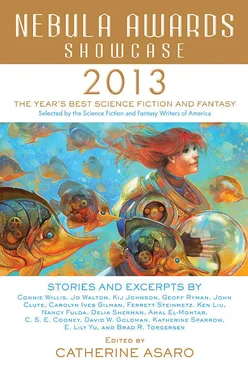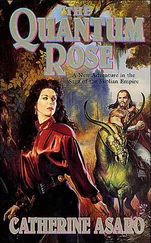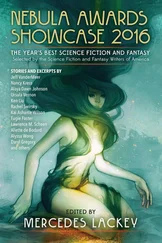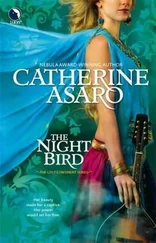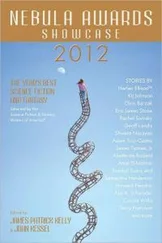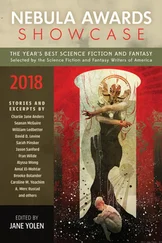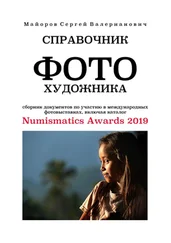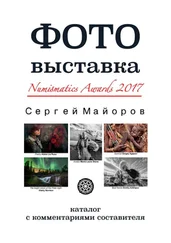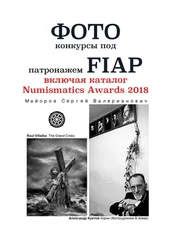They’d think she was crazy, just like Antigua had. And if she insisted, they’d probably tell Dr. Fairchild, who would think she was crazy, too. Maybe if she just went along, and was agreeable and polite, she could keep out of trouble until the Creature showed up to rescue her.
Africa clapped her hands sharply. “Y’all get back inside, and get on with dinner. Unless you’re hankering to tell Mrs. Charles she ain’t going to eat until three?”
“No, ma’am,” said China with feeling. “I likes my black skin just fine on my back where it belong.”
The other women laughed and went back into the kitchen. Africa looked down at Sophie. “I ’spect you wants a corn cake.”
Sophie hesitated. That kitchen was probably as full of germs as it was of flies. And none of those slaves looked very clean. Still, she was hungry, and she loved corncakes. Lily used to make them, light and spongy and a little sweet. Besides, she was the heroine of this adventure, and heroines never got so much as a head cold.
“Please, ma’am. If it’s not any trouble.”
Africa led her through the flies and heat to a wooden bin full of flat, grayish things that looked like cardboard cookies. The corn cake tasted even more like cardboard than it looked, but Sophie was empty enough to choke it down anyway, and even remembered to thank Africa for it before going outside, where Antigua sitting on the bench waiting for her. “Come on, if you done stuffing you face. I gots work to do.”
She got up and trotted purposefully away, Sophie at her heels.
As they came into the yard, Sophie was hit with a truly eye-watering stink. “What’s that ?”
“Soap boiling.” Antigua pointed to where three Negro women with their sleeves rolled up were stirring a big iron pot over an open fire.
Sophie sneezed. “That’s not what soap smells like.”
“How else pig fat and lye supposed to smell? What you make your soap from in New Orleans? Manna?”
“I don’t know. We buy our soap at a store.”
Antigua rolled her eyes. “I ’spect everything better in New Orleans.”
Sophie didn’t bother to respond. It was obvious the slave girl was bound and determined to take everything she said as a slight and an insult. There’d been girls like that at school. The only thing to do was keep her mouth shut and hope Mammy was friendlier.
Antigua picked her way across the yard with her pink skirts held up out of the mud, with Sophie trailing behind, gaping at the busy slaves like a tourist on Bourbon Street. Each cabin was a workshop, and the work done there spilled out into the yard: barrel making, carpentry, leather-work, forging iron. They fetched up at a cabin where a woman sat in the door, stitching at a cloud of white stuff. A mysterious, rhythmical clacking came from inside.
“Afternoon, Asia,” Antigua said. “This here is Sophie. Mr. Robert send her on a boat from New Orleans. Mrs. Charles say give her some decent clothes.” Antigua wrinkled her nose. “Better wash her first. And be quick. I taking her to Mammy, and there ain’t much time before dinner.”
Asia bundled the white cloud into her arms. “She better come on in, then.”
Sophie followed Asia into the cabin. The clacking came from a huge wooden loom worked by a shadowy figure, arms flying, flat, bare feet working the treadles like a giant spider.
Asia shook her head. “That Antigua. She so full of herself, she liable to bust like a bullfrog one fine day. This here’s Sophie, Hepzibah. She need some decent clothes, right quick.”
The clacking died away, and the weaving woman disentangled herself from the loom. When she stood up, Sophie saw she was thin, and would have been tall if her back hadn’t been curled like a hoop. “Welcome, Sophie. That a mighty pretty dress you got there.” Hepzibah took a fold of the blue gingham shirtwaist and rubbed it between her fingers. “I ain’t never seen such fine weaving. Where this fabric come from?”
Sophie pulled away nervously. “New Orleans. My mama bought it for me.”
“Then your mama ain’t got good sense,” Asia said. “That dress ain’t seemly for a big girl like you. Make a nice Sunday dress for one of the childrens, though.”
“No!” Sophie crossed her arms tightly, panicked. What if changing her clothes meant she couldn’t go home? What if she left her dress in the past and Mama was mad? “It’s mine. You can’t have it.”
Hepzibah frowned. “It ain’t Christian, keeping something ain’t no use to you when there’s a plenty other folks could use it.”
Her expression told Sophie that Hepzibah wouldn’t hesitate to remove the dress by force. Reluctantly, she took it off—and her bra, and her underpants—and, miserably embarrassed, stood in a corner while Asia sponged her briskly with cold water out of a bucket. Hepzibah gave her a pair of coarse cotton drawers and a nightgown-like chemise, a long brown homespun dress and a sacking apron. When Sophie was dressed, Asia raked through her hair with her fingers and braided it in six tight plaits, tied a white cloth she called a “tignon” over them, and knotted the ends into rabbit ears.
“There,” she said. “I ’spect you be getting something nicer directly. Light-skinned girl like you bound to end up in the Big House.”
Sophie came out into the yard, feeling awkward and itchy and hot. Antigua sauntered away from the young stable hand she’d been teasing, and gave Sophie a contemptuous once-over. “Well, you clean,” she said. “Ain’t nothing ever going to make you decent.”
Sophie spared a wistful thought for the Natterjack, whose magic made the time-traveling children fit in whenever they went. What with wondering what was going to happen to her and Antigua hustling her from pillar to post, she was much too worried to pay much attention to the scenery. She passed the maze without even thinking to look at it.
And then she saw Oak River Big House.
It stood on a rise surrounded by gardens and flowering trees, three stories of bright red brick, with a wide gallery, tall white columns, and a double stair that curved graceful arms around a marble fountain in which a stone nymph poured water out of an urn. It was splendid and proud and any Fairchild who entered it must be proud, too.
Sophie stood up straighter. She’d asked the Creature for an adventure, and adventures had to be full of misunderstandings and hardships, or what was the point? She was a Fairchild, and this was her ancestral home.
She followed Antigua around the fountain to a blue door that opened onto a long, stone-floored corridor. A young black man in a short blue jacket came out of a door carrying a glass on a silver tray. “Careful, Antigua,” he said. “Young Missy send her a note, make her cross as two sticks.”
Antigua shrugged and herded Sophie into a room furnished with a big desk and shelves full of papers.
“Mammy, this here’s Sophie,” she announced, curtseying. “She from New Orleans.” And then she left.
Sophie, who’d been expecting someone fat and jolly and Aunt Jemima-ish, studied the Negro woman behind the desk with a sinking heart. She was thin as a rake, nunnishly dressed in black and white, and looked about as jolly as Mama in a temper.
The woman up from the note she was reading, adjusted her narrow steel spectacles, and fixed Sophie with a sharp gaze that reminded her uncomfortably of a particularly strict math teacher she’d had in fifth grade.
“Mrs. Charles has told me about you, Sophie. She says you are rude and spoiled and possibly a thief. I won’t tolerate a thief and I won’t tolerate uppity behavior, whatever color you are. The law doesn’t care who your father is, and neither do I. If your mother was a slave, so are you. Do you hear me?”
Читать дальше
